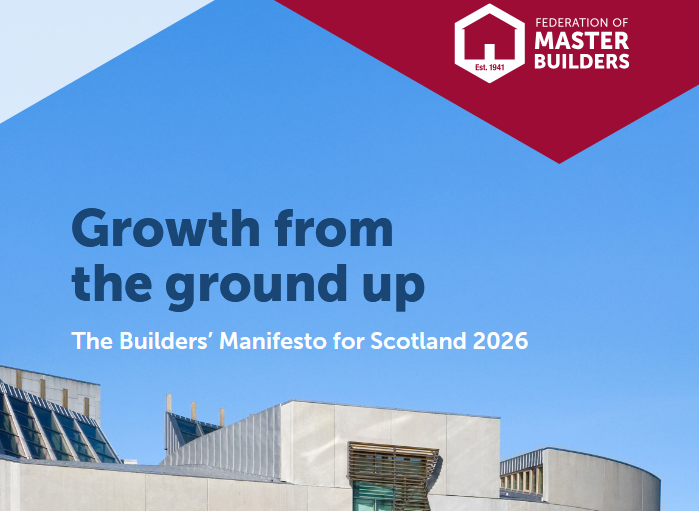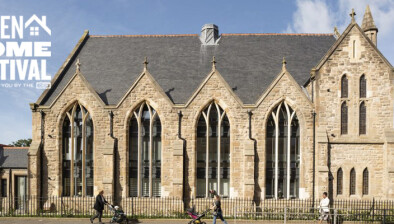Housing given starring role in FMB’s Holyrood manifesto

The Federation of Master Builders is calling on the next Scottish Government to reform the planning system and introduce clear policies that give businesses and consumers the confidence to invest in retrofit
The calls form part of FMB Scotland’s 2026 builders’ manifesto: Growth from the Ground Up, which was launched at Holyrood on 12 November during a parliamentary reception hosted by Monica Lennon MSP, with remarks from Ben Macpherson MSP, minister for higher and further education.
The event brought together parliamentarians, industry leaders and local building firms as the sector set out its priorities ahead of the May 2026 Scottish Parliamentary elections - a pivotal moment as Scotland prepares to shape the future of its housing and construction policy.
With around 44,000 SME construction companies operating in Scotland, the FMB is urging the next Scottish Government to take coordinated action to unlock Scotland’s housing delivery, accelerate retrofit and support local firms through a more predictable skills, planning and procurement environment.
Construction contributes £10 billion to Scotland’s GVA and delivers £2.94 of economic value for every £1 spent, yet small builders continue to face skills shortages, rising costs and delays that restrict growth.
New FMB data shows workloads grew +30% in the first half of 2025, with enquiries up +56%, but 72% of firms report delays caused by skills shortages and 69% have raised prices amid higher wage and materials costs. Planning delays and regulatory changes remain among the most frequent causes of project disruption, contributing to Scotland’s estimated shortfall of nearly 100,000 homes.
Another key policy request is to work with the UK Government to plan and implement a licensing scheme for building companies operating in the repair, maintenance and improvement sector.
New research from the FMB has found that rogue builders have cost UK consumers £14.3 billion over the past five years, underscoring the urgent need for mandatory builder licensing to protect homeowners and raise standards. Scotland is the most affected region, with 36% of homeowners reporting financial losses averaging £2,647 - far above the UK average of £1,759.
The manifesto sets out proposals across five key areas: skills, licensing, retrofit, planning and public sector procurement. It also calls for the creation of a dedicated minister for construction, arguing that the sector spans responsibilities currently split across several portfolios.
Five key areas in The Builders’ Manifesto for Scotland 2026
Skills
Over 200,000 people work directly in Scotland’s construction industry, yet apprenticeship funding has stagnated while employer costs continue to rise. According to the Construction Industry Training Board, Scotland will need an additional 3,590 workers every year between 2025 and 2029 to meet demand.
To prevent a worsening skills crisis, the next Scottish Government must prioritise investment in construction training and apprenticeships, recognising the sector’s critical role in delivering housing, infrastructure, and net zero goals. It should also work closely with industry bodies and colleges to develop a coordinated plan to boost recruitment and ensure a steady pipeline of skilled tradespeople for the future.
Standards and Licensing
Currently, anyone can carry out construction work in Scotland without demonstrating competence or qualifications, posing risks to quality, safety, and consumer protection. With 86% of FMB members supporting the introduction of a licensing scheme, the industry is united in its call for reform.
The next Scottish Government should work in partnership with the UK Government to design and implement a mandatory licensing system for firms operating in the repair, maintenance and improvement sector. This would professionalise the industry, drive up standards, and give homeowners confidence that they are hiring qualified, trustworthy builders.
Retrofit and Energy Efficiency
Improving the energy performance of Scotland’s existing homes is essential to meeting climate targets, cutting emissions, and supporting green jobs. Retrofitting properties with insulation and low-carbon heating systems represents one of the biggest opportunities to drive local employment while tackling fuel poverty.
To accelerate progress, the next Scottish Government must introduce clear policies and measurable targets that give businesses and consumers the confidence to invest in retrofit. It should also reform existing grant and loan schemes to make energy efficiency upgrades simpler, fairer, and more accessible to homeowners and small contractors.
Planning and Housebuilding
Scotland faces a housing shortfall of nearly 100,000 homes, with small builders now delivering far fewer homes than they did 30 years ago. Complex planning regulations, high costs, and slow decision-making have made it increasingly difficult for smaller firms to build, limiting supply and driving up prices.
The next Scottish Government should reform the planning system to streamline approvals, reduce unnecessary costs, and ensure small housebuilders are not disadvantaged by bureaucracy. It should also work with the Scottish National Investment Bank to expand access to fair and flexible finance, enabling local firms to deliver the new homes Scotland urgently needs.
Public Sector Contracts
The Scottish public sector spends over £4 billion a year on construction, representing about half of total sector investment. However, small and local firms often find themselves excluded from public contracts due to burdensome procurement and pre-qualification processes.
To unlock local economic potential, the next Scottish Government must work with contracting authorities to simplify and standardise tendering procedures, ensuring that high-quality SMEs can compete on a level playing field. Making public sector contracts more accessible would strengthen communities, boost local economies, and ensure that public spending delivers maximum social value.
Gordon Nelson, FMB Scotland director, said: “Scotland’s small, micro and medium-sized builders are central to meeting the country’s housing, retrofit and economic goals, yet they continue to face avoidable barriers in skills, planning, standards and procurement. Our priority is to ensure these challenges are addressed head-on.
“The five areas in our Builders’ Manifesto set out a clear path for a stronger, safer and more productive construction sector. Scotland cannot deliver the homes and energy upgrades it needs without backing the local builders who do the work on the ground and the introduction of a licensing scheme.”
Brian Berry, CEO of The Federation of Master Builders, said: “It was fantastic to be in Edinburgh for FMB Scotland’s inaugural parliamentary reception to launch our manifesto ahead of next year’s elections.
“The event brought together parliamentarians from across the political spectrum, showing strong support for our key priorities, from helping employers take on more apprentices to addressing Scotland’s housing and skills challenges. With construction contributing over £10 billion to Scotland’s economy, it’s vital that the next Government works with the FMB to raise standards and deliver more homes.”







